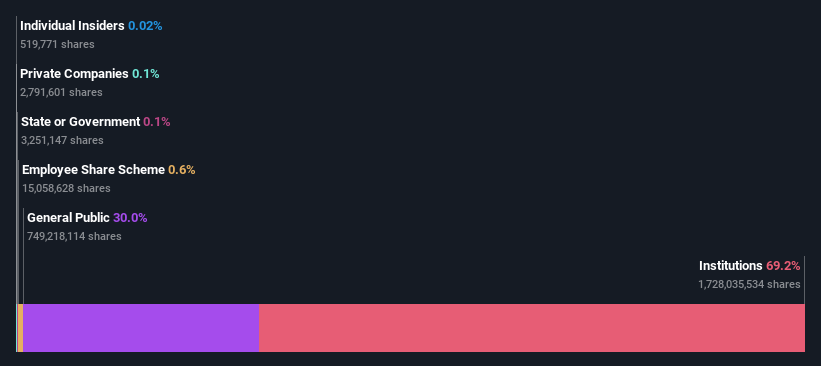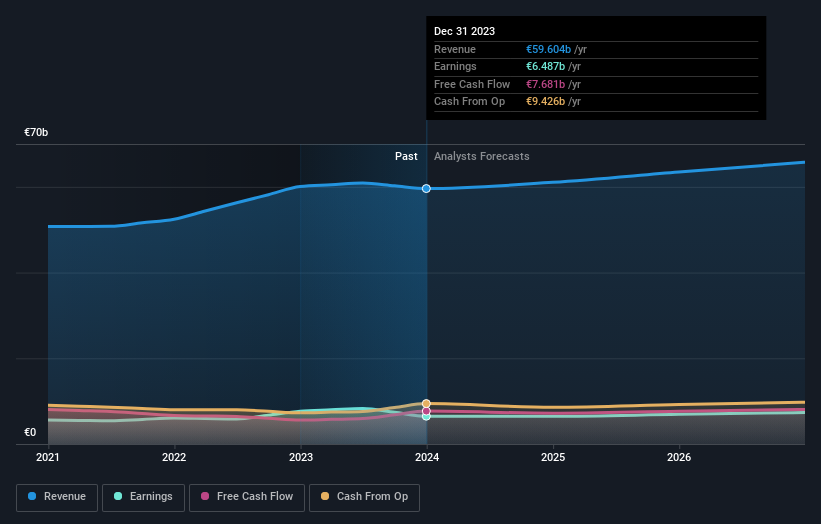- United Kingdom
- /
- Personal Products
- /
- LSE:ULVR
With 69% ownership in Unilever PLC (LON:ULVR), institutional investors have a lot riding on the business

Key Insights
- Institutions' substantial holdings in Unilever implies that they have significant influence over the company's share price
- A total of 25 investors have a majority stake in the company with 37% ownership
- Ownership research along with analyst forecasts data help provide a good understanding of opportunities in a stock
If you want to know who really controls Unilever PLC (LON:ULVR), then you'll have to look at the makeup of its share registry. We can see that institutions own the lion's share in the company with 69% ownership. Put another way, the group faces the maximum upside potential (or downside risk).
And things are looking up for institutional investors after the company gained UK£3.2b in market cap last week. One-year return to shareholders is currently 14% and last week’s gain was the icing on the cake.
In the chart below, we zoom in on the different ownership groups of Unilever.
See our latest analysis for Unilever

What Does The Institutional Ownership Tell Us About Unilever?
Institutional investors commonly compare their own returns to the returns of a commonly followed index. So they generally do consider buying larger companies that are included in the relevant benchmark index.
As you can see, institutional investors have a fair amount of stake in Unilever. This implies the analysts working for those institutions have looked at the stock and they like it. But just like anyone else, they could be wrong. It is not uncommon to see a big share price drop if two large institutional investors try to sell out of a stock at the same time. So it is worth checking the past earnings trajectory of Unilever, (below). Of course, keep in mind that there are other factors to consider, too.

Since institutional investors own more than half the issued stock, the board will likely have to pay attention to their preferences. Hedge funds don't have many shares in Unilever. Our data shows that BlackRock, Inc. is the largest shareholder with 8.7% of shares outstanding. With 5.3% and 2.5% of the shares outstanding respectively, The Vanguard Group, Inc. and Wellington Management Group LLP are the second and third largest shareholders.
On studying our ownership data, we found that 25 of the top shareholders collectively own less than 50% of the share register, implying that no single individual has a majority interest.
Researching institutional ownership is a good way to gauge and filter a stock's expected performance. The same can be achieved by studying analyst sentiments. There are a reasonable number of analysts covering the stock, so it might be useful to find out their aggregate view on the future.
Insider Ownership Of Unilever
The definition of company insiders can be subjective and does vary between jurisdictions. Our data reflects individual insiders, capturing board members at the very least. Company management run the business, but the CEO will answer to the board, even if he or she is a member of it.
I generally consider insider ownership to be a good thing. However, on some occasions it makes it more difficult for other shareholders to hold the board accountable for decisions.
Our most recent data indicates that insiders own less than 1% of Unilever PLC. Being so large, we would not expect insiders to own a large proportion of the stock. Collectively, they own UK£23m of stock. Arguably recent buying and selling is just as important to consider. You can click here to see if insiders have been buying or selling.
General Public Ownership
With a 30% ownership, the general public, mostly comprising of individual investors, have some degree of sway over Unilever. While this group can't necessarily call the shots, it can certainly have a real influence on how the company is run.
Next Steps:
I find it very interesting to look at who exactly owns a company. But to truly gain insight, we need to consider other information, too. Case in point: We've spotted 1 warning sign for Unilever you should be aware of.
If you are like me, you may want to think about whether this company will grow or shrink. Luckily, you can check this free report showing analyst forecasts for its future.
NB: Figures in this article are calculated using data from the last twelve months, which refer to the 12-month period ending on the last date of the month the financial statement is dated. This may not be consistent with full year annual report figures.
New: AI Stock Screener & Alerts
Our new AI Stock Screener scans the market every day to uncover opportunities.
• Dividend Powerhouses (3%+ Yield)
• Undervalued Small Caps with Insider Buying
• High growth Tech and AI Companies
Or build your own from over 50 metrics.
Have feedback on this article? Concerned about the content? Get in touch with us directly. Alternatively, email editorial-team (at) simplywallst.com.
This article by Simply Wall St is general in nature. We provide commentary based on historical data and analyst forecasts only using an unbiased methodology and our articles are not intended to be financial advice. It does not constitute a recommendation to buy or sell any stock, and does not take account of your objectives, or your financial situation. We aim to bring you long-term focused analysis driven by fundamental data. Note that our analysis may not factor in the latest price-sensitive company announcements or qualitative material. Simply Wall St has no position in any stocks mentioned.
About LSE:ULVR
Unilever
Operates as a fast-moving consumer goods company in the Asia Pacific, Africa, the Americas, and Europe.
Established dividend payer and good value.

